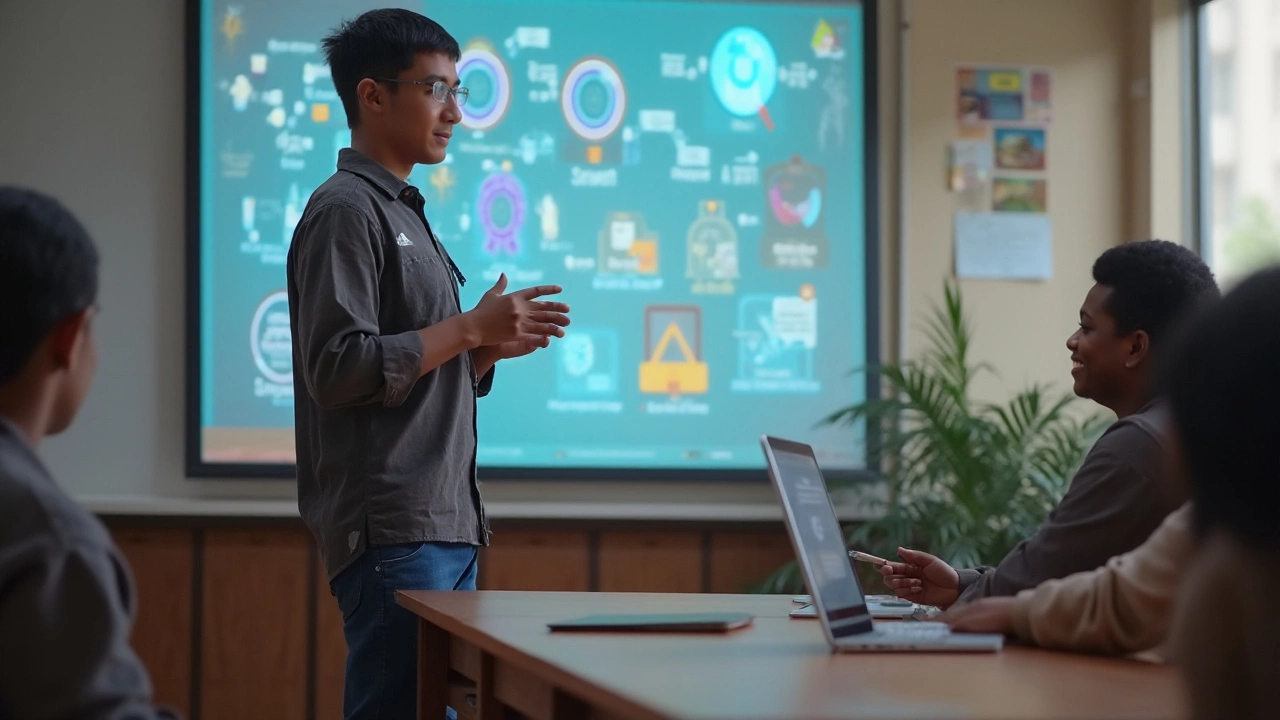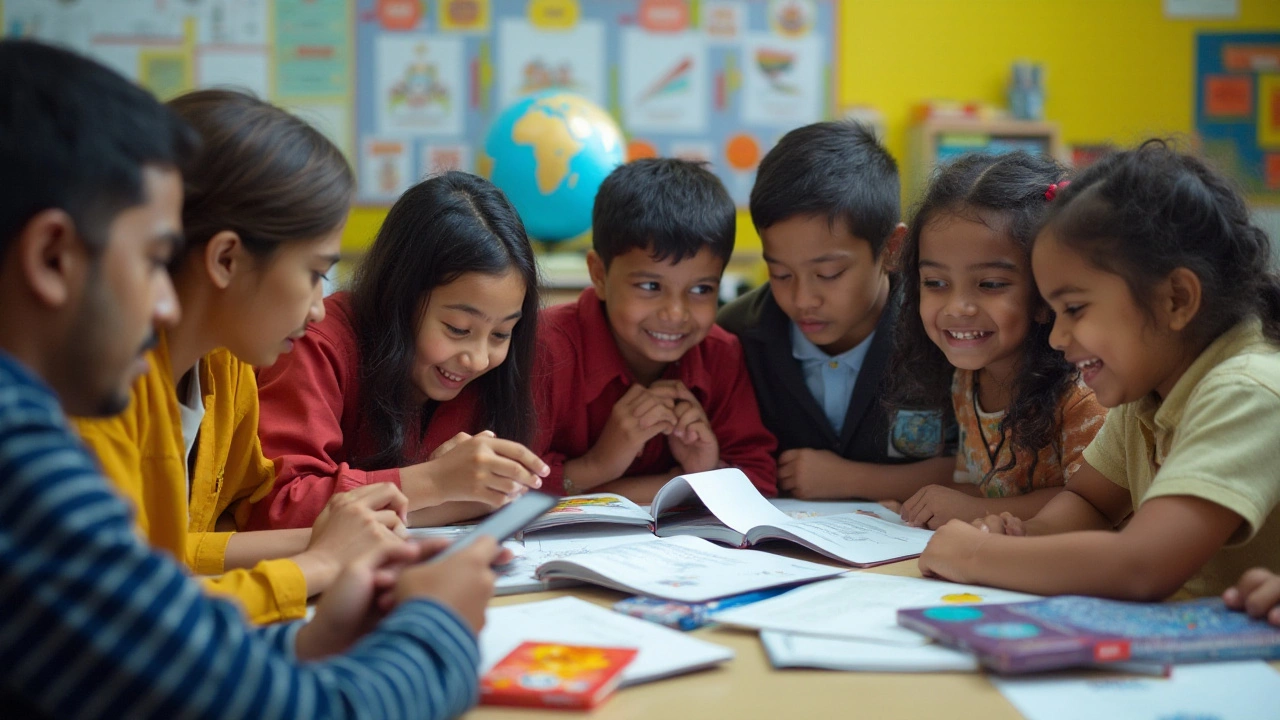In the ever-evolving landscape of education, choosing the right board for schooling is crucial. Among the various boards in India, the Central Board of Secondary Education (CBSE) has emerged as a popular choice among students and parents alike. This preference is driven by various factors, including its comprehensive curriculum, nationwide acceptance, and the balanced focus on theoretical and practical knowledge.
The CBSE's structured syllabus is designed to equip students with the essential knowledge and skills required in the modern world. It's not just the depth of subjects that appeal to parents, but also how the board emphasizes the application of knowledge, equipping students to think critically and solve real-world problems.
- Introduction to CBSE
- Global Recognition and Benefits
- Curriculum Design and Structure
- Teaching Methods and Evaluations
- Skill Development Focus
- Why Parents Prefer CBSE
Introduction to CBSE
The Central Board of Secondary Education, commonly known as CBSE, is the national education board of India for public and private schools. Established in 1929, CBSE has evolved to become a pivotal part of the country's educational framework. The board aims to provide a robust, holistic education that not only enhances general knowledge but also fosters the intellectual, social, and cultural growth of students. Amid various educational choices, its syllabi and learning structures set a benchmark for high-quality education in India.
CBSE's influence extends beyond India's borders, with numerous affiliated schools across 28 countries, thereby providing an education that is valued globally. This worldwide recognition ensures that students transferring schools internationally experience minimal disruption, a significant advantage for families with transferable jobs. According to UNESCO reports, CBSE schools overseas facilitate cultural exchange and maintain a standard of education that aligns well with international standards, expanding opportunities for Indian expatriates. This adaptability and global presence underscore the board's commitment to accessible, quality education.
One defining aspect of CBSE is its connection with national competitive exams such as the Joint Entrance Examination (JEE) for engineering and the National Eligibility cum Entrance Test (NEET) for medical courses. This link not only prepares students for the exams but also aligns the high school curriculum with the requirements of these challenging tests, giving CBSE students a competitive edge. A study by the Times of India indicated that CBSE students form a significant percentage of the toppers in these exams annually, showcasing the board's effectiveness in preparing students for higher education fields.
Moreover, the CBSE syllabus emphasizes math and science subjects, equipping students with analytical skills crucial for modern job markets. It promotes continuous and comprehensive evaluation (CCE), reducing pressure by assessing students periodically to understand their strengths and areas for improvement. This continuous feedback mechanism helps nurture a learning environment that not only focuses on academic excellence but also on personal growth and development. The board provides textbooks developed by the NCERT (National Council of Educational Research and Training), known for their depth and clarity, which serve as the primary study material for the students.
Adapting to modern educational needs, CBSE has integrated vocational subjects and life skills into its curriculum, aiming to promote entrepreneurship and self-employment among students. These additions cater to diverse career interests, ensuring that education is not solely about academics but also about preparing students for a range of future pursuits. In recent years, CBSE has undertaken initiatives like the introduction of AI and coding as part of the curriculum, keeping pace with technological advancements and encouraging logical thinking and problem-solving skills.
"Education is the most powerful weapon which you can use to change the world." - Nelson Mandela
Global Recognition and Benefits
The CBSE, or Central Board of Secondary Education, is not just a dominant force within the confines of India but is recognized and respected across the globe. This recognition stems from its structured curriculum which balances both theoretical and practical knowledge, embodying a robust learning system that matches international standards. The adaptability and rigor of the CBSE syllabus not only prepare students for national competitive exams but also open pathways to global opportunities, enabling students to pursue higher education in leading international universities. With an extensive network of schools scattered across several countries, students who travel abroad can seamlessly continue their education without disrupting their learning process. This global recognition makes CBSE a preferred choice for families who relocate frequently, ensuring consistency in education.
The Times of India once noted, "CBSE's emphasis on holistic development and conceptual understanding equips students to excel both in India and globally." This underscores the valued approach of the CBSE system which does not only focus on rote learning but encourages critical learning methods that are essential for personal and intellectual growth.
Beyond its geographical reach, one of the remarkable benefits of the CBSE is its alignment with international educational expectations. The board collaborates with several international partners to ensure that its curriculum remains relevant and competitive on a global scale. This is demonstrated by the growing number of foreign institutions welcoming CBSE graduates, often with open scholarships and advanced placement credits. This benefit is crucial in today’s world where global mobility and cross-cultural experiences are becoming a key component of educational and professional success. Parents often tilt towards CBSE for its ability to offer these dual advantages — a robust educational base at home, and a promising future abroad.
For parents and students considering their long-term career ambitions, the advantages of the CBSE board become even more significant. It is well-known that top-tier Indian exams, like the IIT-JEE and NEET, are structured around the CBSE syllabus. This gives CBSE students a competitive edge over others. Moreover, many international standardized tests, such as SAT, have portions that closely align with the subjects covered under the CBSE curriculum, thereby doubling the global recognition CBSE-certified students receive. The board's commitment to providing a consolidated yet flexible curriculum aids students in not only excelling in India but thriving on international platforms as well.

Curriculum Design and Structure
The CBSE curriculum is meticulously crafted to provide a balanced approach to education, ensuring both depth and breadth in learning. Its structure emphasizes a comprehensive understanding across a variety of subjects, from sciences and mathematics to humanities and languages, providing a robust platform for students to explore their interests and aptitudes. One hallmark of the CBSE framework is its progressive nature, where students are encouraged to build upon what they have learned in previous classes, enhancing their analytical and cognitive skills.
A key aspect of the CBSE's design is its focus on integrating real-world applications within its theoretical components. This educational philosophy ensures that learners not only absorb information but also understand how to apply this knowledge in practical scenarios. For instance, in subjects like chemistry or biology, students are involved in lab work that complements their classroom lessons, effectively bridging the gap between theoretical learning and real-world application. Through this method, students become adept at critical thinking and problem-solving, skills that are invaluable in higher education and beyond.
To maintain uniformity and relevance, the CBSE board regularly updates its curriculum, aligning it with national educational standards and global trends. This adaptability makes it a versatile framework that meets the changing needs of society and the job market. The board ensures that subjects have a modern relevance, such as the inclusion of environmental studies and computer science, which are crucial in today's tech-driven world. The commitment to staying relevant ensures that the education provided is future-ready.
| Subject | Class Hours | Practical Component |
|---|---|---|
| Physics | 200 | 30% |
| Chemistry | 180 | 40% |
| Biology | 160 | 50% |
The emphasis on a rigorous yet flexible curriculum extends to their evaluation methodologies, where grading systems are designed to assess a student's true understanding rather than rote memorization. This approach nurtures creativity and critical thinking. According to an education expert quoted by the Times of India, "CBSE's blend of traditional and innovative methods of teaching instills a deeper sense of learning, preparing students for real-life challenges." Such strategies underscore the board's mission of nurturing well-rounded individuals ready to make their mark in various professional fields.
Teaching Methods and Evaluations
Teaching methods within the Central Board of Secondary Education (CBSE) framework are crafted to nurture a student's comprehensive development. Unlike traditional rote learning techniques, CBSE emphasizes understanding and applying knowledge beyond the classroom. This is achieved through diverse pedagogical strategies, focusing on engaging students interactively and encouraging analytical thinking. The teaching approach in CBSE schools often incorporates a blend of lectures, collaborative group work, and technology-assisted learning, ensuring students are not just passive recipients of information but active participants in the learning process. Many schools under the CBSE umbrella are adopting smart classrooms and digital platforms to enhance teaching effectiveness and cater to varying student learning styles.
Assessment in CBSE is equally robust, integrated into the curriculum to holistically evaluate a student's progress. The board employs the Continuous and Comprehensive Evaluation (CCE) system, designed to reduce stress on students and give comprehensive feedback on their intellectual development. This method encourages regular assessments, allowing teachers to identify specific areas where a student might need improvement. It also includes a variety of test formats, such as projects, presentations, and practical exams, to assess a range of skills beyond textbook learning. This kind of evaluation ensures that evaluation isn't confined to written exams alone but extends to real-world application.
A unique aspect of CBSE assessment is the balance between formative and summative evaluations. Formative assessments are conducted through the academic year with a focus on skill development and conceptual understanding, providing continuous feedback to students. Summative assessments, largely culminating in the end-of-term exams, evaluate the cumulative learning and ensure students have a thorough grasp of their coursework. This blend not only prepares students for future academic challenges but also fosters a deeper understanding of subjects. A report from the National Institute of Educational Planning and Administration notes that the CCE system in CBSE reduces academic anxiety and helps students approach learning more positively.
The role of teachers in this approach cannot be overstated. A CBSE teacher often works as a guide rather than just an instructor, facilitating discovery-based learning where students engage in inquiry and critical thinking. Teachers undergo regular training sessions to stay updated on modern teaching techniques and integrate them effectively in their pedagogy. This professional development ensures that educators are equipped to cater to diverse classroom environments and address the distinct needs of every learner.
According to Dr. Vinay Swarup Mehrotra, "Teachers play an integral role in shaping an inquisitive and resilient mind. CBSE's approach provides the necessary scaffolding to make this transformation."
CBSE also encourages co-curricular activities as part of its evaluation strategy, recognizing their importance in fostering a well-rounded education. This includes sports, arts, and cultural activities, aiming to identify and nurture individual talents. By integrating co-curricular activities into their evaluation criteria, CBSE schools ensure students develop essential life skills such as teamwork, leadership, and resilience. By emphasizing both academic and personal growth, the board uniquely positions its students to thrive in diverse circumstances. This holistic teaching and evaluation approach underscores why the CBSE is a preferred choice for many parents when considering the best educational framework for their children.

Skill Development Focus
The Central Board of Secondary Education (CBSE) has carved a niche for itself, not only through academic excellence but also by prioritizing skill development, which adequately prepares students for the dynamic demands of the modern job market. This focus is crucial in a world where the application of knowledge can often outweigh mere academic success. The board has integrated various skill-oriented subjects and activities into its curriculum to ensure students emerge as well-rounded individuals, equipped with both theoretical knowledge and practical skills.
One of the key areas where CBSE has made significant strides is through the introduction of vocational courses. These courses are meticulously designed to provide students with hands-on experience in fields like information technology, retail, travel and tourism, and more. They aim to make students workforce-ready by bridging the gap between classroom learning and industry requirements. This move has been widely praised as it encourages students to explore different career paths beyond traditional roles and helps them develop useful skills relevant to their interests and future careers.
The board's emphasis on skill development also extends to the enhancement of soft skills such as communication, problem-solving, and critical thinking. These are integrated into regular subjects and evaluated as part of the formative assessment processes. Teachers employ diverse teaching methods, including group discussions, role plays, and project-based learning, to instill these skills. As a result, students are more adept at expressing themselves clearly and navigating complex challenges both in academic environments and life situations.
Also, extracurricular activities under CBSE play a pivotal role in fostering skills like leadership, teamwork, and artistic expression. Competitions, clubs, and events organized at school levels engage students in various capacities, challenging them to think outside the box and develop talents that might not be apparent through traditional academics. These activities are not only enjoyable but essential for learning interpersonal skills and understanding collaborative work dynamics.
"Education is not the learning of facts, but the training of the mind to think." – Albert Einstein. This philosophy aligns well with CBSE's approach as it seeks to stretch a student's potential beyond textbook knowledge, nurturing innovators and thinkers of tomorrow.
Moreover, significant digital initiatives have been undertaken by the board to ensure that students are tech-savvy in an increasingly digital world. Workshops and seminars on coding, digital literacy, and cybersecurity are frequently conducted as part of the co-curricular offerings. This not only provides students with a competitive edge but also prepares them for careers in burgeoning sectors like technology, which is largely shaping the future job market.
In essence, the CBSE's commitment to skill development is steadfast and comprehensive. By embedding these essential skills into their educational framework, the board prepares its students not just for academic examinations but for life beyond school. Such a holistic approach ensures that CBSE students stand out in higher education and professional realms, exemplifying why this board remains a preferred choice for countless parents and educational institutions across the nation.
Why Parents Prefer CBSE
Choosing the right educational board for their children is one of the most significant decisions parents make. The Central Board of Secondary Education (CBSE) is often at the top of their list due to several compelling reasons. To begin with, CBSE is recognized across India and internationally, ensuring that the educational qualifications are accepted in most universities worldwide. This global recognition offers children the flexibility to pursue higher studies either in India or abroad without the hassle of credential verification. This is crucial for families who move frequently, whether due to job transfers or other commitments, as CBSE offers uniformity in its syllabus, making transitions seamless for students. This consistency means that regardless of the school, the curriculum remains standardized, avoiding disruption in a child’s education journey.
Another key factor is the curriculum itself. CBSE’s curriculum is meticulously designed to be both balanced and comprehensive. It not only emphasizes core subjects like mathematics, science, and languages but also encourages skill development in a variety of other areas. Parents appreciate the board’s focus on holistic development, as it encompasses physical, emotional, and intellectual growth. Such an approach ensures that students emerge as well-rounded individuals who are well-prepared for real-world challenges. In an era where rote learning is often criticized, CBSE takes pride in fostering analytical thinking and problem-solving capabilities. This prepares students for competitive exams such as the IIT-JEE and NEET, as the board’s syllabus aligns with the requirements of these assessments. Because of this alignment, numerous parents believe CBSE gives their children an edge in these competitive exams.
Moreover, the emphasis on English language proficiency within the CBSE syllabus is another attractive feature. Since English is a global lingua franca, proficiency in the language opens up numerous opportunities for students in both global higher education and the job market. This preparation begins early, as subjects are often taught in English, further strengthening comprehension and communication skills. Statistical data supports this, showing that students from CBSE backgrounds perform better in English proficiency tests. Schools under this board also engage in innovative teaching methods to ensure students are not just memorizing facts but understanding concepts. This conceptual learning paves the way for innovative thinking and creativity.
In addition, CBSE stresses the importance of co-curricular activities, embedding them within the regular curriculum. This inclusion not only breaks the monotony of academic rigour but also nurtures talents like art, music, and sports. Such activities are often integral to a child's confidence building, leadership skills, and teamwork. Parents take comfort in knowing their children are encouraged to excel beyond academics, fostering a more enjoyable and enriched learning experience. The education system’s flexibility allows adjustments for varying paces of learners, accommodating everyone's educational needs.
| Aspect | Percentage of Preference |
|---|---|
| Global Recognition | 80% |
| Curriculum Design | 75% |
| Skill Development | 70% |
"CBSE’s structure and flexibility have played a major role in shaping the future of education in India, expanding into international spheres," says a well-known educationist from India.Having a strong support system and a well-defined curriculum adds to the peace of mind for many parents, making CBSE a preferred choice over other educational boards. It's not just about following tradition; it’s about choosing what best equips their children for future success in an ever-changing world.
